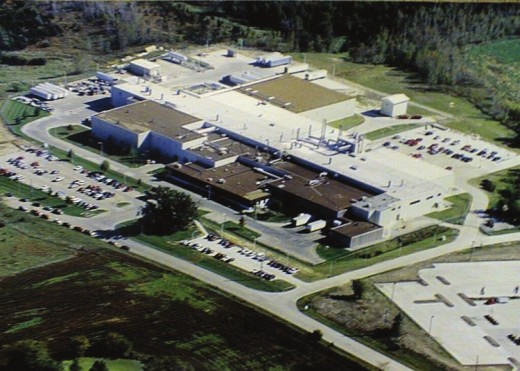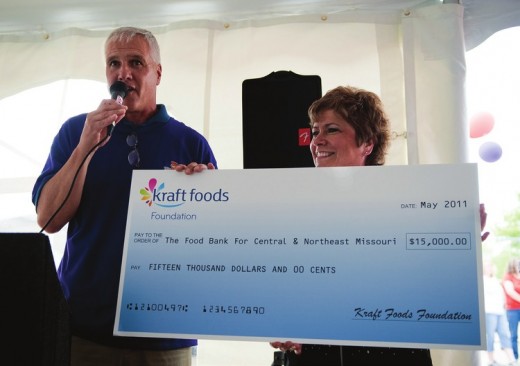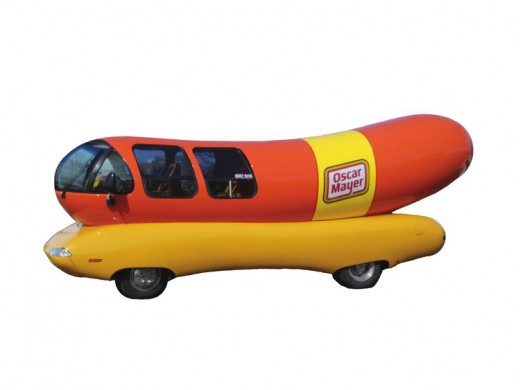Hot Dog! Kraft Foods celebrates quarter century in Columbia
May 13, 2011

This was the first plant in the Oscar Mayer network to run 24/7 and is the only one solely dedicated to producing hot dogs.
So far they’ve made more than 28 billion. That number is hard to imagine, so Kraft came up with this fun fact: Linked end-to-end, they would reach the moon and back more than five times.
So, of course, the company served Oscar Mayer wieners at its anniversary celebrations, brought in the Wienermobile and marked the milestone by giving a bunch of dogs to The Food Bank for Central & Northeast Missouri.
Well, more than a bunch — 10,000 pounds, along with a $15,000 donation.
More than 700 employees and guests attended the two company picnics during the past two weekends at the manufacturing plant on Paris Road, including members of Congress and other public officials.
“Probably the biggest partner we have with the community is the Central Missouri Food Bank,” Plant Manager John Strotbeck said. “We donate quite a bit of hot dogs and have provided funding and donations over the years.”

The Columbia production plant is the largest donor of protein to the Food Bank, and its community outreach also includes the Boy and Girl Scouts, Hickman High School and, through the Partners in Education program, Derby Ridge Elementary School.
“There are a lot of things we do in the community to make sure that we’re not only a manufacturer,” said Strotbeck, who has been with Kraft for 32 years and became the Columbia plant manager in 2002. “We are trying to be supportive of the community as well.”
Kraft estimated the total economic impact of the manufacturing plant on the region, including payroll, taxes, utilities and local goods and services, is approximately $65 million each year.
During the ceremony, Strotbeck paid tribute to the 20 employees who have worked there since day 1 — or, in the case of John Wulff, even longer. He helped build the manufacturing plant and then went to work inside when it opened. He’s now a senior engineer.
“The original plant was small in size compared to the other Oscar Mayer facilities,” Wulff said during the May 7 ceremony. “But we were the first focus plant to be strictly focused on hot dogs.”
Wulff said the plant’s growth can be attributed to the employees and the city.

“You are the type of workers that make a company like Kraft want to locate right here in the middle of the country, in the middle of Missouri because of the quality of work you do,” Still said.
U.S. Sen. Roy Blunt, whose wife, Abigail Blunt, lobbies for Kraft as senior director of external relations in Washington, praised the manufacturing plant’s retention rate. “It says a lot about the workforce and Oscar Mayer and the plant management and the partnerships that you have,” he said.
The key factors that are keeping employees with the company for so long, Strotbeck said, are company pride and a positive work environment.
“We certainly have a lot of family employees that work here, but there are many spouses who work here and children,” Strobeck said, referring to second-generation employees. “So that tells you something that many parents have their children come work here as well.”
Wulff represented Kraft at a meeting of the City Council to consider phasing in a steep increase in municipal sewer fees that would cost the plant an extra $48,000 annually. He explained that the Columbia plant competes in the global market and within the company, and he pointed out that Kraft’s manufacturing plant in Madison, Wis., has aggressively cut costs.
The city backed the proposal and recently approached Kraft with a plan to save costs by piping wastewater to the nearby landfill to help speed up the process of capturing methane used to produce electricity. Gary Kespohl, the Council’s 3rd Ward representative, called it a potential “win-win” project and pointed out that the plant uses a million gallons of water a month. Strotbeck, however, said the company isn’t interested in the project at this time.
Kraft does participate in a recycling program with the Public Works Department launched in 1999 that saved more than $210,000 in waste disposal costs in the first eight years, according to a city report.
The city has created compost from about 32 tons of hot dog casings, a byproduct of the manufacturing process. The casings, which look like cooked spaghetti, keep the links intact as they travel through the smoking and cooking processes. This casing is stripped away from the wieners before they are packaged. Without the composting project, this material would be deposited in the landfill, the report said.



